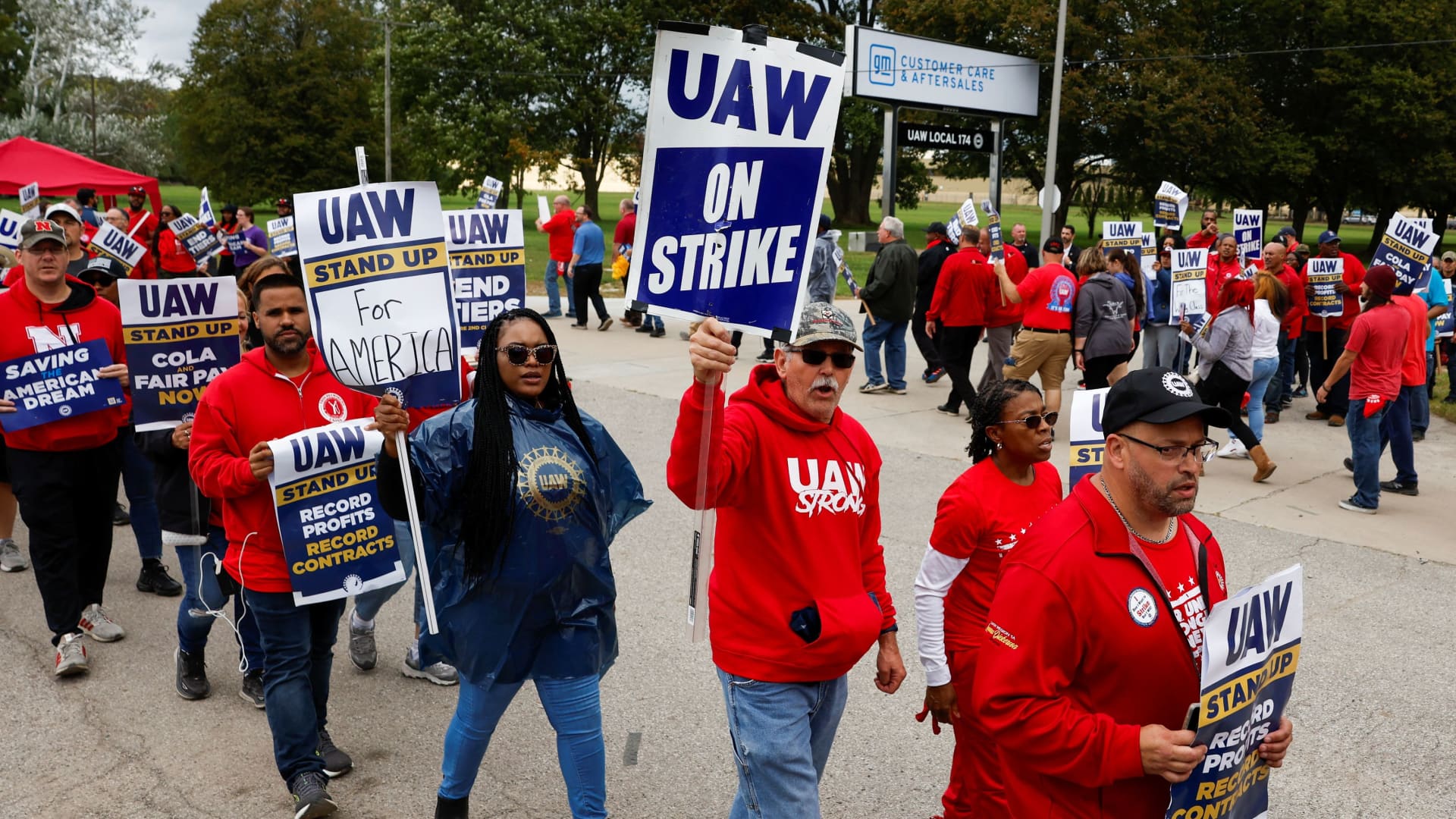The United Auto Workers union is preparing for possible strikes at the nation’s three unionized automakers next month, as they seek to regain lost concessions and protect members during the transition to electric vehicles.
High-stakes negotiations between the United Auto Workers and Detroit automakers could lead to a strike later this month, putting added pressure on already beaten-down shares of Ford Motor.
GM, Ford, and Tesla are expected to face rising labor costs, whether or not a strike occurs as the United Auto Workers' labor deal with the Detroit-Three automakers nears its expiration.
The United Auto Workers are in negotiations with the "Big Three" U.S. automakers over a new labor contract, with the possibility of a strike looming as talks have been rocky and counteroffers have been rejected.
The United Auto Workers union is ready to go on strike at American automakers if a tentative deal is not reached by Thursday night, with the union demanding significant wage increases and the return of traditional pension plans and retiree healthcare for all members.
Negotiations between the United Auto Workers and Detroit automakers Ford, General Motors, and Stellantis are reaching a critical point as the possibility of a simultaneous strike at all three companies looms.
The local auto workers' union at Ford's Sharonville transmission plant is preparing for a potential strike as the contract between the United Auto Workers union and the Big Three automakers expires, with picketing instructions issued and workers standing strong behind negotiators.
The United Auto Workers union has gone on strike against General Motors, Ford, and Stellantis simultaneously, demanding increased wages, benefits, and job protections, marking the first time in its history that it has struck all three of America's unionized automakers at once.
Auto workers have initiated a series of strikes after failing to reach an agreement with the three largest US manufacturers over a new contract, marking a major industrial labor action and targeting all three Detroit carmakers simultaneously.
Talks between the Detroit Three automakers and the United Auto Workers continue with workers on strike, as President Joe Biden sends a team to help resolve the strike.
The ongoing United Auto Workers strike against the Big Three automakers could result in gains for Tesla and foreign automakers as Ford, GM, and Stellantis face challenges in transitioning to electric vehicles and potentially raising prices, according to Wedbush analysts.
The United Auto Workers union is set to escalate their strike against the Big Three automakers in an effort to combat stagnant wages and other concessions, with UAW President Shawn Fain expected to announce which plants will join the strike next.
Summary: The United Auto Workers' strike against the Big Three automakers continues, with Ford reaching a deal with Canadian auto workers but no breakthroughs in negotiations with the UAW, as President Joe Biden prepares to visit the picket lines amid concerns over parts and supply shortages.
Strikes by United Auto Workers at General Motors, Stellantis, and Ford plants could escalate on Friday if negotiations do not make significant progress, potentially affecting more automaker sites.
The United Auto Workers strike is exacerbating supply chain issues and causing delays in car repairs due to a strained car parts market.
The United Auto Workers strike against the Detroit-Three auto makers has made significant progress, giving the union a major breakthrough.
The United Auto Workers union has announced that Ford, General Motors, and Stellantis are likely to avoid an expansion of the ongoing strikes, as significant progress has been made in negotiations with GM regarding the future of auto jobs and the transition to electric vehicles.
The president of the United Auto Workers union announced progress in negotiations with Detroit's Big Three automakers and that the strike will not be expanding this week, citing a "major breakthrough" with General Motors placing their electric battery manufacturing under the national master agreement with the union.
The president of the United Auto Workers urges union members to continue their strike against Detroit carmakers, highlighting the importance of the labor movement and the fight against corporate greed.
The United Auto Workers strike continues as workers reject a tentative deal, while Canada's auto union, Unifor, faces difficulties in negotiations with GM.
The United Auto Workers union has expanded its strike to include Ford Motor Co.'s Kentucky Truck Plant, adding to the thousands of autoworkers already on strike at various facilities, resulting in significant economic losses.
The United Auto Workers union escalated its strike against Ford by ordering workers to go on strike at the company's largest plant, the Kentucky Truck Plant, after negotiations failed to yield a satisfactory contract agreement.
The United Auto Workers union escalated its strikes against Detroit Three automakers by walking off their jobs at Ford's Kentucky truck plant, affecting the largest and most profitable Ford plant in the world.
The United Auto Workers' strike at Ford's Kentucky Truck plant is increasing pressure on Stellantis and General Motors as contract negotiations continue, potentially signaling the endgame of coordinated walkouts at the Detroit Three.
The United Auto Workers' strike at Ford's Kentucky truck plant raises concerns about the spread of the economic effects of the work stoppage and the potential for more aggressive strikes against other automakers such as GM and Stellantis.
The United Automobile Workers union's strike is seen as a step toward better pay for both union and nonunion autoworkers, as the U.S. automakers claim nonunion rivals put them at a disadvantage while labor leaders hope for increased unionization in Southern states.
A tentative agreement between Ford and the United Auto Workers (UAW) union could signal progress towards resolving the strike, with implications for the Biden administration and the future of the auto industry.
